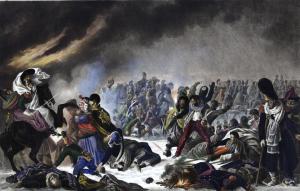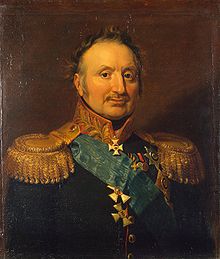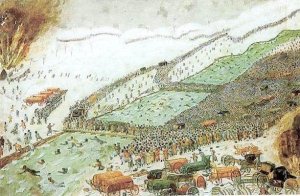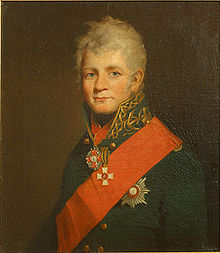The 29th Bulletin is famous because it is the first time Napoleon admitted to the French people the disaster that had befallen his army. He soon left his army in Russia to head back to Paris to begin building a new army for the spring campaign that was surely to come. Napoleon departed the following day (4th), leaving Marshal Murat in command of the Grande Armée.
Dodge reproduced this Bulletin, “penned by the emperor himself on the eve of leaving the army,” with the following preface, “whatever its prevarications, in view of the fact that those were not the days of special war correspondents and telegraphs, and compared with the reports of other unsuccessful campaigns by the commanding generals, it will hold its own.”

Napoleon
by Vasily Vereshchagin
“Molodechno, December 3, 1812. Up to the 6th of November the weather had been perfect, and the movement of the army was executed with the greatest success. The cold had commenced the 7th. From this moment, each night we lost several hundred horses, which died in the bivouac. Arrived at Smolensk, we had already lost many cavalry and artillery horses. The Russian army of Volhynia was opposed to our right. Our right left the line of operation of Minsk, and took for pivot of its operation the line of Warsaw. The emperor learned at Smolensk, the 9th, this change of line of operations and guessed what the enemy would do. However hard it seemed to him to undertake a movement in such a cruel season, the new state of things necessitated it. He hoped to reach Minsk, or at least the Berezina, before the enemy; he left Smolensk the 13th; he slept at Krasnoi the 16th. The cold, which had commenced the 7th, gained sharply, and from the 14th to the 15th, and to the 16th, the thermometer marked 16 and 18 below freezing [-16º to -18º Réaumur, -20º to -23º C]. The roads were covered with sheet ice. The cavalry, artillery and train horses perished every night, not by hundreds but by thousands, especially the horses of France and Germany. More than thirty thousand horses perished in a few days; our cavalry was all afoot; our artillery and our transports were without teams. We had to abandon and destroy a great number of our guns and all our munitions of war and mouth.
This army, so fine the 6th, was very different dating from the 14th, almost without cavalry, without artillery, without train. Without cavalry we could not reconnoitre a quarter of a league; still, without artillery we could not risk a battle and stand with firm foot; we had to march as as not to be forced to a battle which the want of munitions prevented our desiring; we had to occupy a certain space so as not to be turned, and this without cavalry; which would reconnoitre and tie together the columns. This difficulty, joined to an excessive cold suddenly arrived, made our situation a sorry one. Men whom nature had not fashioned stoutly enough to be above all the chances of fate and of fortune seemed overcome, lost their gaiety, their good humour, and dreamed of nothing but misfortune and catastrophe; those who it had created superior to all things kept their gaiety and their ordinary manners, and saw a new glory in the different difficulties to be surmounted.
The enemy who saw on the roads the traces of this horrible calamity which had struck the French army sought to profit by it. He enveloped all the columns with his Cossacks, who carried off, like the Arabs in the deserts, the trains and the carriages which lost their way. This contemptible cavalry, which only makes a noise and is not capable of driving in a company of voltigeurs, was made redoubtable by the favour of circumstances. However, the enemy was made to repent all of the serious attempts which he undertook; he was broken by the viceroy before whom he placed himself, and he lost large numbers.
 The Duke of Elchingen (Ney), who with three thousand men formed the rearguard, had blown up the ramparts of Smolensk. He was surrounded and found himself in a critical position; he escaped it with the intrepidity which distinguishes him. Having held the enemy off from him the whole day of the 18th, and having constantly repulsed him, at night he made a movement by the right bank, crossed the Borysthenes, and upset the calculations of the enemy. The 19th the army passed the Borystheenes at Orsha, and the Russian army, tired, having lost many men, there stopped its attacks.
The Duke of Elchingen (Ney), who with three thousand men formed the rearguard, had blown up the ramparts of Smolensk. He was surrounded and found himself in a critical position; he escaped it with the intrepidity which distinguishes him. Having held the enemy off from him the whole day of the 18th, and having constantly repulsed him, at night he made a movement by the right bank, crossed the Borysthenes, and upset the calculations of the enemy. The 19th the army passed the Borystheenes at Orsha, and the Russian army, tired, having lost many men, there stopped its attacks.
The army of Volhynia moved by the 16th on Minsk and was marching on Borisov. Dombrovski defended the bridge-head of Borisov with three thousand men. The 23rd he was driven in and obliged to evacuate the position. The enemy thus passed the Berezina, marching on Bobr; Lambert’s division was the vanguard. The 2nd Corps, commanded by the Duke of Reggio (Oudinot), which was at Chereia, had received the order to move on Borisov, to assure to the army the passage of the Berezina. The 24th, the Duke of Reggio met Lamber’s divsion four leagues from Borisov, attacked it, beat it, made two thousand prisoners, took six guns, five hundred wagons of the baggage of the army of Volhynia, and threw back the enemy to the right bank of the Berezina. General Berkheim, with the 4th cuirassiers, distinguished himself by a fine charge. The enemy found safety only in burning the bridge, which is more than three hundred fathoms long.
Still the enemy occupied all the crossings of the Berezina. This river is forty fathoms wide. It was floating a great deal of ice, and its banks were covered with marshes three hundred fathoms long, which made it difficult to cross. The enemy’s general had placed his four divisions at different outlets, where he guessed the French army would want to pass.
The 26th, at the point of the day, the Emperor, after having deceived the enemy by different movements made during the day of the 25th, moved on the village of Studianka, and at once, despite a division of the enemy and in it presence, had two bridges thrown over the river. The Duke of Reggio crossed, attacked the enemy, and followed him fighting two hours; the enemy retired on the bridge-head of Borisov. General Legrand, officer of first merit, was seriously wounded, but not dangerously. During the whole day of the 26th and 27th the army crossed.
The Duke of Bellune [Victor], commanding the 9th Corps, had received orders to follow the movements of the Duke of Reggio to form the rearguard, and to contain the Russian army of the Dvina, which followed him. Partouneaux’s division was the rearguard of the corps. The 27th, at midday, the Duke of Bellune arrived with two divisions at the bridge of Studianka.
Partouneaux’s division left Borisov at night. A brigade of this division which formed the rearguard was charged to burn the bridges, left at 7 o’clock in the evening; it arrived between 10 and 11; it sought its first brigade and its division general, who had left two hours before, and which it had not met on the route. Its search was in vain: it became anxious. All that has been since ascertained is that this first brigade, leaving at 5 o’clock, lost its way at 6, turned to the right instead of turning to the left, and marched two leagues in this direction; that at night and nearly frozen it rallied on the fires of the enemy, which it took for those of the French army; thus surrounded it was captured. This cruel mistake made us lose two thousand infantry, three hundred horses and three guns. The rumour runs that the division general was not with his column, and had marched alone.
The whole army passed by the morning of 28th, the Duke of Bellune held the bridge-head on the left bank; the Duke of Reggio, and behind him all the army, were on the right bank.
Borisov having been evacuated, the Armies of the Dvina and of Volhynia got into communication; they concerted an attack. The 28th, at the point of day, The Duke of Reggio notified the Emperor that he was attacked; a half an hour afterwards, the Duke of Bellune was attacked on the left bank. The army took arms. The Duke of Elchingen moved in the rear of the Duke of Reggio and Duke of Trévise behind the Duke of Elchingen. The fighting became lively: the enemy wished to turn our right. Doumerc, commanding the 5th division of cuirassiers, and who made part of the second corps remaining on the Dvina, ordered a charge of cavalry to the 4th and 5th regiments of cuirassiers at the moment when the legions of the Vistula were engaging in the woods to pierce the centre of the enemy, who were beaten and put to rout. These brave cuirassiers broke in, one after another, six infantry squares, and routed the enemy’s cavalry, which came to the relief of his infantry: six thousand prisoners, two flags and six guns fell into our hands. On his side, the Duke of Bellune charged the enemy vigorously, beat him, made five or six hundred prisoners, and held him beyond cannon-shot from the bridge. General Fournier made a fine charge with cavalry. In the combat of the Berezina the army of Volhynia suffered much. The Duke of Reggio was wounded; his wound is not dangerous: it is a ball he received in the side.
The next day, the 29th, we remained on the battlefield. We had to choose between two routes, that of Minsk and that of Vilna. The route of Minsk passes through the middle of a forest, and uncultivated marshes, where it would have been impossible for the army to subsist. The route to Vilna, on the contrary, passes through very good country. The army, without cavalry, feeble in munitions, horribly fatigued with fifty days’ march, carrying along its sick and the wounded of so many combats, needed to reach its magazines. On the 30th headquarters was at Plechtchennitsy; the 1st December, at Staïki ; and the 3, at Molodetchna, where the army corps received its first convoys from Vilna.
All the wounded officers and soldiers and all which was in the way, baggage, etc. were moved towards Vilna.
To say that the army needs to re-establish its discipline, to repair itself, to remount its cavalry, its artillery and its material, is the result of the statement just made. Rest is its first need. Matériel and horses have arrived. Bourchier has already more than twenty thousand remount horses in the different depots. The artillery has already repaired its losses. The generals, the officers and the soldiers have suffered much with fatigue and want. Many have lost their baggage on account of losing their horses, a few by the ambushes of the Cossacks. The Cossacks took a number of isolated men, geographical engineers who were sketching positions, and wounded officers who marched without precaution, preferring to run risk rather that to march in order and in the column.
The reports of general officers commanding corps will make known the officers and soldiers who most distinguished themselves, and the details of all these memorable events.
In these movements the Emperor always marched in the middle of his Guard, the cavalry commanded by the marshal Duke of Istria [Bessières], and the infantry commanded by the Duke of Danzig [Lefebvre]. HIs Majesty was satisfied with the good spirit that his Guard showed; it has always been ready to move wherever the circumstances demanded; but the circumstances have always been such that its simple presence sufficed, and it was never necessary to put it into action.
The Prince of Neuchâtel [Berthier], the grand Marshal [Duroc], the grand Squire [Caulaincourt], and all the aides-de-camp and the military officers of the house of the Emperor always accompanied His Majesty.
Our cavalry was dismounted to the degree that we had to reunite the officers who had kept their horses so as to form four companies of a hundred and fifty men each. The generals performed the functions of captains, and the colonels those of subordinates. This sacred squadron, commanded by general Grouchy, and under the orders of the King of Naples [Murat], did not lose sight of the Emperor in all its movements.
The health of His Majesty has never been better.
Dodge, TA (2008) Napoleon’s Invasion of Russia. First Published 1904-07. Frontline Books (an imprint of Pen & Sword Books Ltd), Barnsley, South Yorkshire, UK. p 281–286.
—
Thank you to James Fisher for providing this information.











